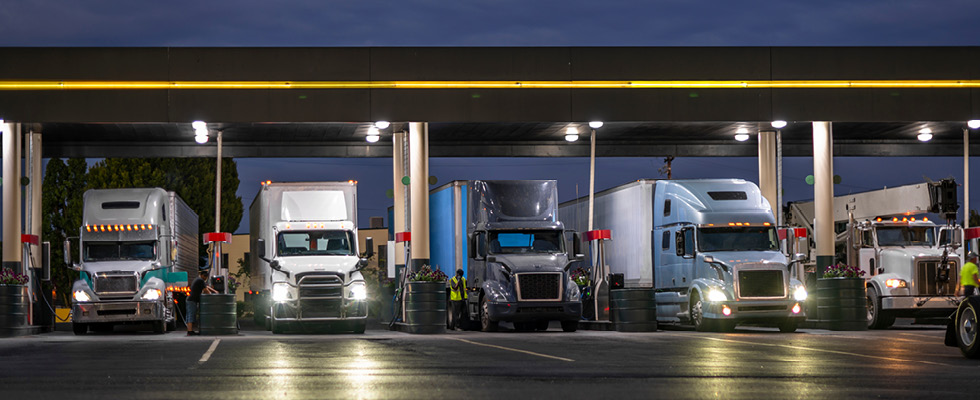
On Feb. 7, a jury in Fresno, California, awarded a total of $15,498,921 to multiple plaintiffs in a suit arising from the rupture and explosion of one of four compressed natural gas cylinders that fueled a newly-purchased truck. The incident occurred during the first fill after the purchase of the truck. The case is Johnson v. Natural Gas Fuel Systems.
New Truck
On Dec. 21, 2018, William Johnson, the owner of B&N Trucking, took a delivery in Bakersfield, California, of two new Kenworth tractor-trucks. B&N had purchased the trucks from Pape Trucks Inc., and they included a natural gas fuel system that was manufactured by Momentum Fuel Technology.
The fueling system included a behind-the-cab system (essentially a large metal box situated behind the cab of the tractor that contained fuel tanks and various components). The tanks within the fueling system were Type 4 carbon fiber compressed natural gas (CNG) tanks designed and manufactured by Carleton Technologies Inc.
‘Transloaded’ Gas
Since the Pape dealer in Bakersfield did not have an on-site compressed natural gas fueling system, an employee of Momentum undertook a process called transloading to fill the tanks on the two trucks. He towed one of the trucks to a local filling station operated by American Natural Gas LLC (ANG) in Buttonwillow, California, where he filled it with compressed natural gas.
That truck was then driven back to Pape, where enough fuel was siphoned into the second truck from the first truck so that the second truck could be driven to the ANG station to complete the filling process.
It was at this point that William Johnson took delivery of the trucks on behalf of B&N. He drove the second truck straight to the same ANG station where the first truck was fueled. He connected the fueling hose to the truck, and the fueling process started. When the truck’s cylinders had been fueled to almost a full load, one of the carbon fiber tanks in the behind-the-cab system ruptured, causing an immediate release of pressure and a significant explosion.
Injuries & Damages
As a result of the explosion, Mr. Johnson sustained catastrophic injuries, including brain damage and multiple fractures, but survived. He was hospitalized for 34 days and spent over two months in rehabilitation facilities after that. His medical expenses were $807,411. The explosion allegedly caused portions of the truck and the filling station to fly hundreds of feet in every direction, resulting in significant structural damage to the ANG facility.
Johnson and his wife filed suit, alleging causes of action for strict products liability and negligence. ANG’s property insurance carrier, Markel American Insurance, paid ANG $498,921 for its losses and then joined the Johnson suit for this amount from the defendants. The defendants were Momentum, Pape and Carleton.
Allegations
The plaintiffs alleged that the carbon fiber tank that ruptured, as well as the CNG delivery system, were “defective” and “unreasonably dangerous.” They contended that the defendants “were aware of feasible alternative designs which would have minimized or eliminated altogether the risk of injury posed by” the tank, as well as the delivery system.
The plaintiffs also contended that the defendants were negligent in the design and manufacture of the tank and system, and that they breached their contractual warranty in the sale of the items.
Finally, they argued that Momentum was negligent in the “selection, hiring, retention, training, education, supervision and/or management of” the employees who “assembled and/or inspected the CNG system and connected” it to the truck.
‘Reasonable Expectations’
The plaintiffs claimed that the tank and system did not meet the reasonable expectations of the ordinary consumer:
“Here, the subject cylinder was designed to be part of a compressed natural gas fueling system to be affixed to the subject truck. The sole purpose of the subject cylinder was to hold natural gas pressured to 3,600 psi [pounds per square inch]. The first time it was filled (on the date of the incident) the subject cylinder ruptured well below 3,600 psi. The subject cylinder failed to perform its singular function. Ordinary consumers are well acquainted with the concept that a tank of any kind should not explode unless over-pressurized, which did not happen here.”
The plaintiffs also argued that Momentum failed to follow its own pre-delivery procedures and fill the truck with gas to 3,600 psi before delivering the truck to B&N Trucking. In addition, they claimed that both Carleton and Momentum had prior knowledge that Carleton was producing lots of tanks wherein some tanks leaked. In the lot of tanks comprising the tank that ruptured in the incident, three of 28 tanks allegedly leaked; a fourth tank was allegedly found to be defective at Carleton.
The defendants denied all of these claims and allegations. Momentum and Carleton pointed to each other as the cause of the incident. Pape apparently blamed them both. There appeared to be no evidence of fault on the part of William Johnson and American Natural Gas.
Trial & Verdict
Trial began on Jan. 13. Four days later, on Jan. 17, the parties entered into a stipulation that the Johnsons’ damages were $15 million, and the damages of Markel Insurance were $498,921. The trial then continued until Feb. 7.
Since the parties had stipulated to the amount of damages, the jury only had to decide the percentages of fault, if any, for each of the defendants. The jury found that Momentum was 70% at fault for the incident. Carleton was assessed 20%, and Pape was assessed 10%.
The trial court then issued its judgment applying these percentages to the stipulated damages, entering judgments against Momentum for $10,849,244; against Carleton for $3,099,784; and against Pape for $1,549,893.
The court record does not indicate that any of the defendants have sought an appeal.


